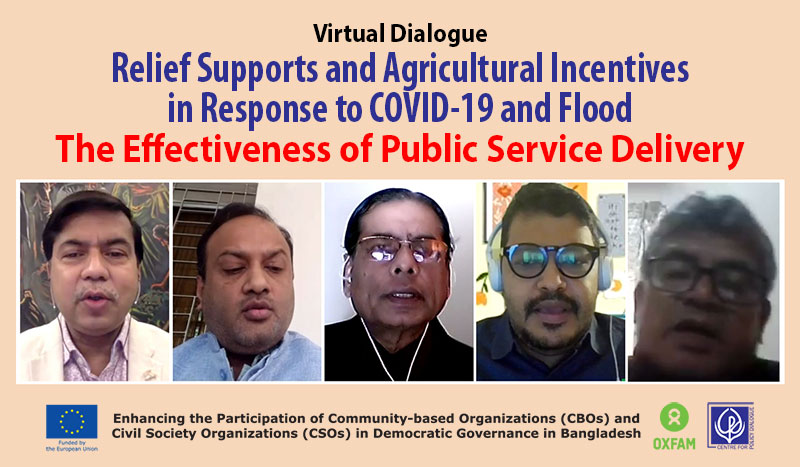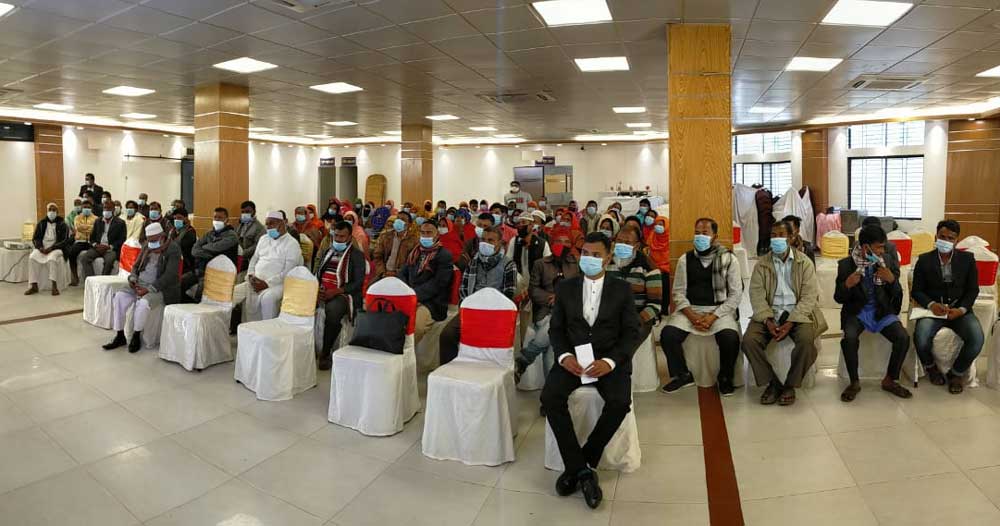
A number of government relief supports to tackle the situation emerging from COVID-19 and flood are allocated at the local level based on the total population of that area. This allocation and subsequent beneficiary selection process of these relief supports should be based on the proportion of vulnerable population not the size of the total population.
These observations emerged at a virtual dialogue titled “Relief Supports and Agricultural Incentives in Response to COVID-19 and Flood: The Effectiveness of Public Service Delivery”, jointly organised by the Centre for Policy Dialogue (CPD) and Oxfam in Bangladesh in partnership with Manab Mukti Sangstha (MMS), and in association with Citizen’s Platform for SDGs, Bangladesh. The virtual dialogue was held on 28 December 2020.
The dialogue was organised as part of the project titled ‘Enhancing the participation of community-based organisations (CBOs) and civil society organisations (CSOs) in democratic governance in Bangladesh’ which is being implemented by the CPD and the Oxfam in Bangladesh, with support from the European Union. The project aims to contribute to the implementation of the Sustainable Development Goals (SDGs) by the Government of Bangladesh in numerous areas.
While giving the keynote presentation, CPD’s Senior Research Associate, Mr Muntaseer Kamal highlighted the flood loss scenario in Sirajganj and presented an assessment of the relief delivery process in the district. He underlined that there is insufficiency of relief supports provided by the Government. There is a general lack of awareness among the local people of Sirajganj regarding the Government hotline services. The beneficiary selection process oftentimes was not participatory due to reasons such as lack of promotion of such initiatives. Mr Kamal also shared that the Government has provided a number of incentives to recover from agricultural losses due to the recent floods. To receive these supports and incentives for the agriculture sector, people have to travel to the Upazila level, which adds to the pre-existing list of challenges. Through the presentation, CPD recommended for creating a detailed database of beneficiaries so that a clear picture of the requirement of the relief support and agricultural incentives can be found.

Professor Dr Md Habibe Millat, MP, Hon’ble Member of Parliament, Government of Bangladesh and Mr Tanvir Shakil Joy, MP, Hon’ble Member of Parliament, Government of Bangladesh joined the dialogue as Special Guests. They highlighted that, since Sirajganj is a highly vulnerable area due to its geographical location, the allocations for government relief supports are insufficient when compared to the needs at the local levels. Mr Tanvir Shakil Joy, MP shared that focus should intensified on creating employment opportunities for the vulnerable people rather than depending solely on relief measures. Professor Dr Md Habibe Millat, MP stated that Members of the Parliament should be involved more actively in the relief distribution process.
Around 120 community leaders, LA and LG representatives from the Chauhali Upazila and Sirajganj Sadar Upazila joined the dialogue and made critical floor interventions. The participants from Sirajganj highlighted the insufficiency of relief supports and also urged for timely distribution of the relief packages. The participants with direct grassroots experience shared that many people are yet to receive the 2500 Taka cash support despite being enlisted. It was also mentioned that the people of Sirajganj, particularly in the remote Char areas, are unable to access various Government hotline services due to poor telecommunication facilities.
Professor Mustafizur Rahman, Distinguished Fellow, CPD, moderated the session. Professor Rahman suggested that the telecommunication in Char areas like Sirajganj could be improved by providing government incentives to telecommunication companies to broaden their network facilities.
Mr Mohammad Soeb Iftekhar, Head of Economic Inclusion and Justice, Oxfam in Bangladesh gave the introductory remarks at the dialogue. Mr Md. Habibullah Bahar, Executive Director, MMS gave the vote of thanks.
Citizens and representatives from community-based organisations (CBOs) from Sirajganj, government officials, academicians, development workers, NGO representatives, private sector representatives, representatives from civil society organisations, and media among others were also present at the dialogue.



